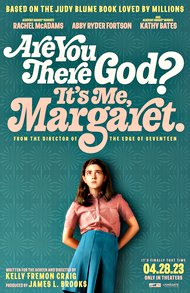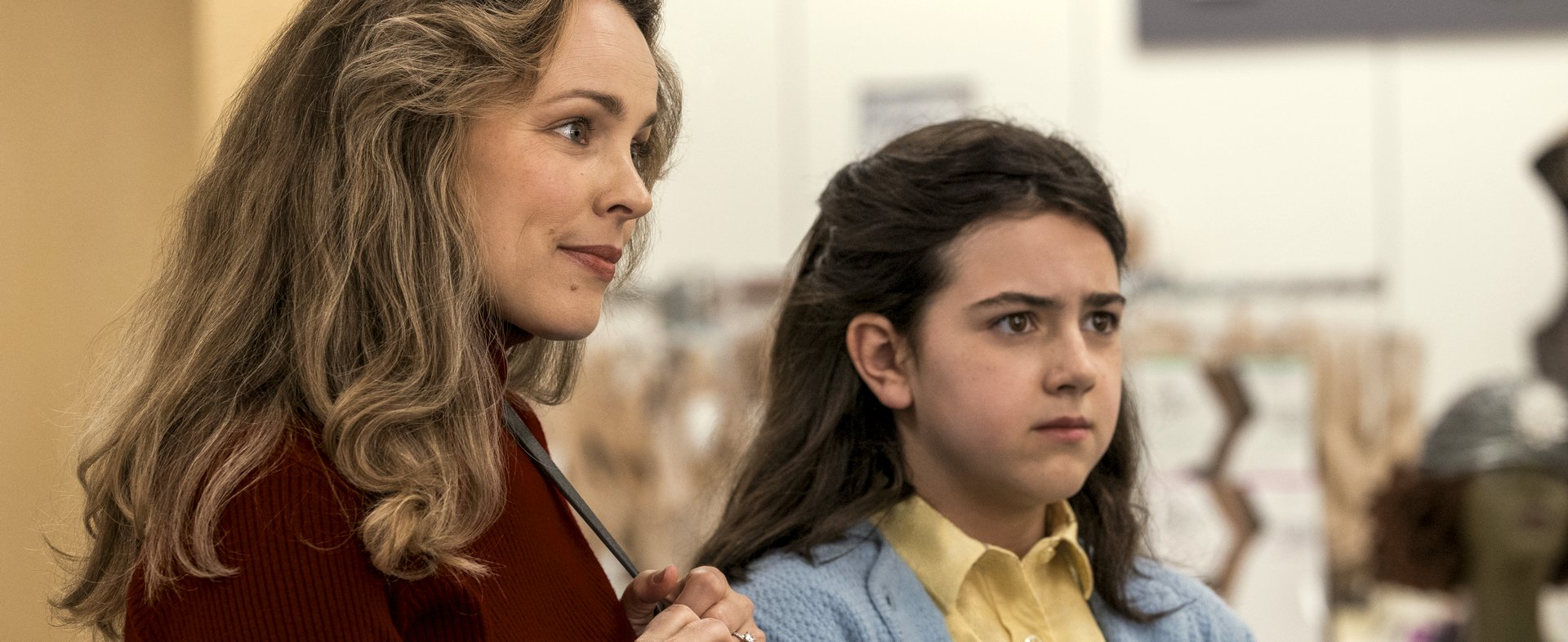Are You There God? It's Me, Margaret
 for thematic material involving sexual education and some suggestive material.
for thematic material involving sexual education and some suggestive material.
Reviewed by: Charity Bishop
CONTRIBUTOR
| Moral Rating: | Very Offensive |
| Moviemaking Quality: |
|
| Primary Audience: | • Aimed at female teens |
| Genre: | Coming-of-Age Comedy Drama Adaptation |
| Length: | 1 hr. 45 min. |
| Year of Release: | 2023 |
| USA Release: |
April 28, 2023 (wide release—3,343 theaters) DVD: July 11, 2023 |


Uncorrected confusion about religions and misunderstanding of the true nature of God
Margaret’s mother is “Christian” (although clearly not born-again) and her father is Jewish (non-practicing). Margaret is being raised without an affiliation to either faith.
According to Margaret, God is not Christian, Muslim nor Jewish, or any other religious entity. He is just a Higher Comrade she can turn to, whenever she needs a slight push to keep going.
Why do so many people reject the real God of the Bible, Creator and Sustainer of the universe, and created a god of their own liking?
How can we know there’s a God? Answer
What is the SOVEREIGNTY OF GOD? Answer
What is “THE FEAR OF THE LORD”? and Why is it important? Answer
What is HUMILITY? and WHY is it important to be humble? Answer
What is the “FURY” of God? Answer
What is the “ANGER OF GOD”? Answer
What are Judgments of God? Answer
About God’s love and an answer to the questions: What is the true nature of God’s love? Is it biblically accurate to say, “God hates the SIN, but loves the SINNER”?
Girl coming of age, beginning adolescence in the 5th or 6th grade
Sexual education in schools and homes
Puberty and menstruation
Peer pressure
Desire for social acceptance
“I want to be like everybody else”
Mother daughter relationship
Plagiarizing her school homework from an encyclopedia
| Featuring |
|---|
|
Abby Ryder Fortson … Margaret Simon Rachel McAdams … Barbara Simon Kathy Bates … Sylvia Simon Benny Safdie … Herb Simon Elle Graham … Nancy Wheeler See all » |
| Director |
|
Kelly Fremon Craig |
| Producer |
|
Gracie Films Lionsgate See all » |
| Distributor |
Here’s what the distributor says about their film: “When her family moves from the city to the suburbs, 11-year-old Margaret navigates new friends, feelings, and the beginning of adolescence.
Margaret Simon is just eleven going on twelve when her family moves from New York City to Farbrook, New Jersey. Margaret’s mother is Christian and her father is Jewish. Margaret has been raised without an affiliation to either faith, and does not practice an organized religion, although she frequently prays to “God” in her own words, beginning by saying, ‘Are you there God? It’s me, Margaret.’ She is beginning to feel uncomfortable with her lack of a religious affiliation.
For a school assignment, she chooses to study people’s religious beliefs, hoping to resolve the question of her own religion in the process. Part of her study involves attending different places of worship to better understand religious practice and also to see if one of them might be right for her. She enjoys spending time with her Jewish paternal grandmother, Sylvia Simon (Kathy Bates), who loves her as she is, and hopes Margaret will embrace Judaism after taking her to her synagogue for Rosh Hashanah services.”
Every woman remembers that painful time of her life when she was twelve years old. Stuck between childhood and womanhood, wondering when she will make that leap, and curious about everything “grown up.” This movie is based on a coming of age novel frequently banned from junior high reading programs due to its frank discussion of mature themes (puberty and menstruation, along with its unflinching attitude toward “religion”). The film is not as explicit as the book, but does still spend a lot of time on these things. It’s touching, but at times, a bit uncomfortable to watch.
Margaret (Abby Ryder Fortson) has come home from summer camp full of excitement and joy, only to have her parents drop a bombshell on her—they are moving to New Jersey, away from her beloved New York, her friends, and most importantly, her grandmother (Kathy Bates). Margaret dreads change, and prays that her new life won’t be as horrible as she expects. On her first day in the neighborhood, she meets a new friend, the “very mature” Nancy (Elle Graham), who invites her to join a four-girl secret club at school. The girls meet up after class and determine their very grown-up rules, which include keeping a record of their crushes, wearing bras, and being honest with each other about certain things, such as first periods.
Though Margaret hasn’t spent much time thinking about these things before, now, under the influence of her friends, she starts desperately praying that God will grow her up. In the meantime, her teacher finds her statement at school that she hates religious holidays puzzling and asks her about it. It turns out Margaret comes from a mixed background. Her mother’s Christian parents disinherited her when she married a Jew, so her parents decided to let her pick her own religion when she grows up. Encouraged by her honesty, the teacher asks her to make religion her long-term topic for the year.
While she navigates the struggles of teenage boys, rumor mills, and curiosity about grown up things, Margaret talks to God a lot, and tries out different religions. She attends temple with her grandmother, she goes to a Pentecostal church with a friend, then a more straight-laced church, and finally, even tries out a Catholic confessional.
Q & A
Are all religions basically the same? Answer
More answers about RELIGIONS
What is a TRUE BIBLICAL CHRISTIAN?
With so many cults and denominations, how can I decide which are true and which are false? Answer
This movie is a strange blend of deep, meaningful conversations and questions about God, and an awkward coming of age story. A lot of it charmed me, and made me remember being that age. Some of it made me sad, for the way people treat each other (everyone thinks they are right, and doesn’t care that a little girl is getting upset). I am not sure who the movie is for, either. It focuses too much on female issues for a male audience, it’s too mature for most preteens, and an adult might not want to revisit it. A lot of the story revolves around getting your first period. An illustration talks about how they “work.” The girls excitedly tell each other “I got it!” and/or have mental breakdowns when it happens. Each time, their mother has to rush in and reassure them and make them okay. In a way, that may be the most touching thing about the film, how much it centers on the relationship between mothers and daughters, and how often a mother comes alongside to guide, teach, and provide comfort.
The author has no particular religion; Margaret at one point proclaims there is no God, but by the end, is talking to Him again. It’s charming how often she talks to him, confiding her soul to him, about the silly things (boys) and the serious ones (her distress for her mom’s abandonment by her parents; her confession she doesn’t want to be Nancy’s friend anymore; her guilt for being mean to a fellow student). We learn neither of her grandparents (Jewish and Christian) tolerate the other side. Her Christian grandparents think she’s going to hell, a painful sticking point for her mom. Margaret says she wishes she had been “born into a religion like other people,” implying that all of them are cultural believers who are making no conscious choices.
Q & A
Who is the author of the novel and what does she believe?
The 1970 novel (of the same title) on which this film is based was written by Judy Blume, author of mostly juvenile fiction titles and a few adult novels. Her ideology runs counter to Biblical Christianity. She “wholly supports the trans community” and has earlier described herself as a ‘gender critical feminist’. This and some of her other books have been criticized and sometimes censored from schools beginning in the 1980s for being too adult in subject matter (age-inappropriate), and controversial in the way sexual and religious topics are handled. Some of her books for older children take a decided turn toward Sexual Humanism and sexual promiscuity. She has sold over 80 million copies.
Other content concerns include “Oh, my G*d!” being used many, many times; God’s name is coupled with a swear word once, and someone uses “Jesus!” as an exclamation.
The girls pour over an anatomy book that has a drawing in it of a penis and how it functions (they joke about it, and one girl admits she’s seen her brother naked) and a copy of Playboy (we don’t see anything, but they talk about her breasts). There’s lots of comparisons of their upper development, conversation about bra sizes, and bra strap snapping; a boy tells a girl she needs to ‘grow an inch, and we both know where,’ and the girls repeat the mantra I “must, must grow my bust!” The girls spread untrue rumors about the most mature girl in the class allowing boys to “feel her up.” Margaret prays to grow breasts and start her period.
It’s an interesting technique for a writer to combine such a serious topic as a child’s relationship with God with so many other frank themes, which makes it a little imbalanced. It’s a meaningful story about a girl searching for the truth as she grows up, but it doesn’t offer any solid answers other than the fact that she decides “alone time” with God is of greater value to her than any organized belief system. In the end, it’s both thought-provoking and a little cringe.
Q & A
- About PRAYER in God’s Word
- PRAYER—Tips for new and growing Christians
- Why aren’t my prayers answered? Answer
- Effective prayer
- What is WORSHIP? Answer
- What is the FEAR OF THE LORD and why is it very important? Answer
- What is REPENTANCE and why is it very important? Answer
- Why is our level of HUMILITY important to God? Answer
- What is FAITH and why is it important? Answer
- What is HOLINESS? Answer
- Why should humans give THANKS to their Creator? What does the Bible say about thankfulness? Answer
See list of Relevant Issues—questions-and-answers.




